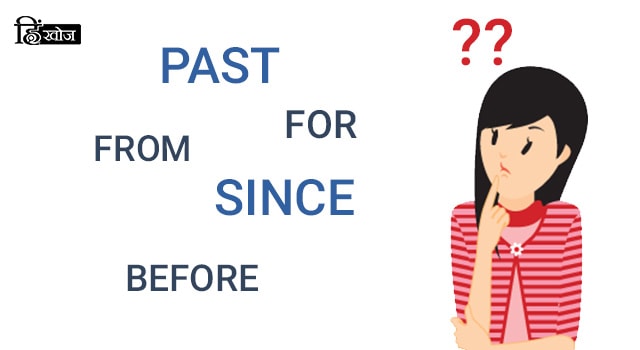Prepositions यानी सम्बन्ध सूचक अव्यय उन शब्दों को काहा जाता है जो हमे वाक्य के subject का सम्बन्ध वाक्य के अन्य शब्दों के साथ जोड़ने में मदद करते हैं।
Prepositions usually stand in front of the noun.
When it comes to preposition rules, it's hard to explain them in one go or in an orderly manner.
The best we can do is to learn them with the help of examples and practise as much as we can.
Prepositions के बहुत सारे types हैं और आज हम बात करेंगे 'Prepositions of time' के बारे में।
Before we move further, let me remind you that we already have a blog on commonly used 'Prepositions of time-1', please read it to get the basic idea of prepositions.
Prepositions of time का प्रयोग एक विशिष्ट समय अवधि, calendar पर एक तारीख, सप्ताह के दिन या वास्तविक समय के बारे में बात करने के लिए किया जाता है।
Today we'll deal with a little more complex prepositions of time and their uses in day-to-day communications with the help of examples.
 SINCE
Since का प्रयोग वर्तमान में चल रहे कार्य या घटना के शुरू होने का समय बताने के लिए किया जाता है।
When we use since, we are saying that something began in the past, but is unfinished.
• I have been studying since this morning.
• मैं आज सुबह से पढ़ रहा हूं।
• I have lived in Delhi since 1997.
• मैं 1997 से दिल्ली में रहता हूं।
FROM
जब आपको किसी भविष्य में होने वाले कार्य की शुरुआत होने का समय बताना है, तब आप FROM का प्रयोग करेंगे।
• The movie starts from 8:30 pm.
• फिल्म 8:30 बजे से शुरू कर देंगे।
From का प्रयोग एक निर्धारित अवधि के लिए भी किया जाता है।
• The museum is open from 9.30 to 6.00 .
• संग्रहालय 9.30 बजे से लेकर 6.00 बजे तक खुला है।
NOTE: The only difference between since and from is that the since is used for an unfinished task (that was started in the past) while from is mostly used to mention the starting point of the task that's going to happen in the future.
FOR
यह एक समय अवधि या एक विशेष समय की मात्रा दर्शाने के लिए प्रयोग किया जाता है।
• I have been living in this country for thirty years.
• मै इस देश में तीस साल से रह रहा हूँ।
• I will come to the party just for an hour.
• मैं सिर्फ एक घंटे के लिए पार्टी में आऊंगा।
BEFORE
Before का अर्थ है किसी निश्चित समय से पहले।
• I have to reach home before the sunset.
• मुझे सूर्यास्त से पहले घर पहुंचना है।
• We moved to London before the war.
• हम युद्ध से पहले लंदन चले गए।
PAST
Past का प्रयोग तब किया जाता है जब आप निर्धारित समय के गुज़र जाने के बाद की बात करते हैं।
Use past when you have reached beyond a certain time limit.
• It was past midnight when we got home.
• जब हम घर आए तब आधी रात से ऊपर हो चुकी थी।
Past का प्रयोग घड़ी का समय बताने के लिए भी किया जाता है।
• The time is ten minutes past two.
• समय है दो बजकर दस मिनट।
CLICK HERE to read our last blog ‘Used To’ : How To Use It Correctly?
Don't forget to download our English learning app Namaste English
SINCE
Since का प्रयोग वर्तमान में चल रहे कार्य या घटना के शुरू होने का समय बताने के लिए किया जाता है।
When we use since, we are saying that something began in the past, but is unfinished.
• I have been studying since this morning.
• मैं आज सुबह से पढ़ रहा हूं।
• I have lived in Delhi since 1997.
• मैं 1997 से दिल्ली में रहता हूं।
FROM
जब आपको किसी भविष्य में होने वाले कार्य की शुरुआत होने का समय बताना है, तब आप FROM का प्रयोग करेंगे।
• The movie starts from 8:30 pm.
• फिल्म 8:30 बजे से शुरू कर देंगे।
From का प्रयोग एक निर्धारित अवधि के लिए भी किया जाता है।
• The museum is open from 9.30 to 6.00 .
• संग्रहालय 9.30 बजे से लेकर 6.00 बजे तक खुला है।
NOTE: The only difference between since and from is that the since is used for an unfinished task (that was started in the past) while from is mostly used to mention the starting point of the task that's going to happen in the future.
FOR
यह एक समय अवधि या एक विशेष समय की मात्रा दर्शाने के लिए प्रयोग किया जाता है।
• I have been living in this country for thirty years.
• मै इस देश में तीस साल से रह रहा हूँ।
• I will come to the party just for an hour.
• मैं सिर्फ एक घंटे के लिए पार्टी में आऊंगा।
BEFORE
Before का अर्थ है किसी निश्चित समय से पहले।
• I have to reach home before the sunset.
• मुझे सूर्यास्त से पहले घर पहुंचना है।
• We moved to London before the war.
• हम युद्ध से पहले लंदन चले गए।
PAST
Past का प्रयोग तब किया जाता है जब आप निर्धारित समय के गुज़र जाने के बाद की बात करते हैं।
Use past when you have reached beyond a certain time limit.
• It was past midnight when we got home.
• जब हम घर आए तब आधी रात से ऊपर हो चुकी थी।
Past का प्रयोग घड़ी का समय बताने के लिए भी किया जाता है।
• The time is ten minutes past two.
• समय है दो बजकर दस मिनट।
CLICK HERE to read our last blog ‘Used To’ : How To Use It Correctly?
Don't forget to download our English learning app Namaste English
Blog Post



